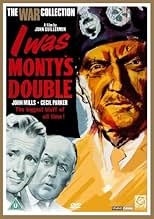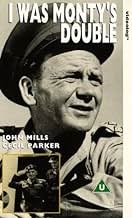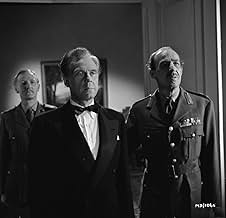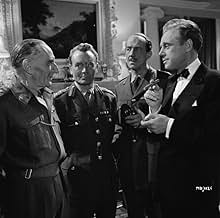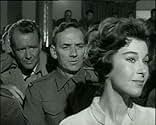IMDb RATING
6.9/10
1.8K
YOUR RATING
During World War II, a British actor impersonates Field Marshal Montgomery in order to confuse German intelligence.During World War II, a British actor impersonates Field Marshal Montgomery in order to confuse German intelligence.During World War II, a British actor impersonates Field Marshal Montgomery in order to confuse German intelligence.
- Director
- Writers
- Stars
- Awards
- 1 nomination total
M.E. Clifton James
- M.E. Clifton James
- (as M. E. Clifton James)
- …
Kenneth J. Warren
- F
- (as Kenneth Warren)
- …
- Director
- Writers
- All cast & crew
- Production, box office & more at IMDbPro
Featured reviews
At the fag-end of the 50's, a generation of long-demobbed soldiers were still trying to cut it in uniform, in a spate of cheap black-and-white war films. More convincing than most was the unknown star of this true story, a minor Australian actor who had been rejected by the entertainment services, and was reluctantly pen-pushing in the pay office, when someone noticed that he was a dead ringer for Montgomery.
This was in the run-up to D-Day, when the allies were desperate to draw enemy attention away from Normandy as the obvious invasion zone. Might a Monty-lookalike be able to fool German intelligence by touring North Africa, as though preparing for a big Mediterranean landing instead?
The actor in question, M.E. Clifton James, is secretly employed as a driver on Monty's staff, in order to get close enough to study his speech and mannerisms. But he doubts his own ability to replicate the character and personality of the great man, not least because 'Jimmy' is a chain-smoking alcoholic. Eventually, jolly optimist John Mills persuades him to go through with it, and suddenly he's stepping off a plane in Gibraltar, under scrutiny from enemy agents (one of them brilliantly sinister, as played by Marius Goring), as well as certain officers who remember Monty from before the war.
Defying many attempts on his life, Jimmy overcomes his desperate shyness, and learns to take massed salutes from whole armies. Then all too soon, D-Day has come and gone, his one brief star-performance is over, and it's back to the humble pay office. Except... they felt it necessary to bolt-on a false ending, about which we can reveal nothing, except that it never happened.
As for the real-life outcome, we have to face the disappointing fact that it was only part of a much larger decoy operation, which did throw the enemy into some confusion, but reports of Jimmy's own effort reaching Hitler's desk seem to be wishful thinking.
The film displays some recognisable weaknesses of those low-budget productions. The over-long opening section is taken up with John Mills' various flirtations, whose only consequence for the story is that his humourless boss (Cecil Parker) decides to replace their seductive secretary with the ugly-beautiful Barbara Hicks, in some ways more arresting. And the way Mills and Parker chat freely in public about top secret plans will grate on the ear of anyone who has worked in intelligence. No war-film of its day was complete without the stuffed-shirt spoilsport Allan Cuthbertson, who duly pops-up here, as does the perennial plug-ugly sergeant Anthony Sagar. Jimmy's one meeting with Monty is awkwardly dodged; we simply cut away from him on the steps of the general's caravan, although split-screen techniques had long since enabled an actor to shake hands with his own double (try the 1937 'Prisoner of Zenda').
None of this really detracts from the joy of the film, principally the deeply-believable performance of a professional actor, acting himself acting Monty. Sympathy and charm shine through this modest man, who seems to have been shabbily treated after the war, when he was reduced to the dole. Hopefully this popular film brought a little benison for the five short years that remained to him.
This was in the run-up to D-Day, when the allies were desperate to draw enemy attention away from Normandy as the obvious invasion zone. Might a Monty-lookalike be able to fool German intelligence by touring North Africa, as though preparing for a big Mediterranean landing instead?
The actor in question, M.E. Clifton James, is secretly employed as a driver on Monty's staff, in order to get close enough to study his speech and mannerisms. But he doubts his own ability to replicate the character and personality of the great man, not least because 'Jimmy' is a chain-smoking alcoholic. Eventually, jolly optimist John Mills persuades him to go through with it, and suddenly he's stepping off a plane in Gibraltar, under scrutiny from enemy agents (one of them brilliantly sinister, as played by Marius Goring), as well as certain officers who remember Monty from before the war.
Defying many attempts on his life, Jimmy overcomes his desperate shyness, and learns to take massed salutes from whole armies. Then all too soon, D-Day has come and gone, his one brief star-performance is over, and it's back to the humble pay office. Except... they felt it necessary to bolt-on a false ending, about which we can reveal nothing, except that it never happened.
As for the real-life outcome, we have to face the disappointing fact that it was only part of a much larger decoy operation, which did throw the enemy into some confusion, but reports of Jimmy's own effort reaching Hitler's desk seem to be wishful thinking.
The film displays some recognisable weaknesses of those low-budget productions. The over-long opening section is taken up with John Mills' various flirtations, whose only consequence for the story is that his humourless boss (Cecil Parker) decides to replace their seductive secretary with the ugly-beautiful Barbara Hicks, in some ways more arresting. And the way Mills and Parker chat freely in public about top secret plans will grate on the ear of anyone who has worked in intelligence. No war-film of its day was complete without the stuffed-shirt spoilsport Allan Cuthbertson, who duly pops-up here, as does the perennial plug-ugly sergeant Anthony Sagar. Jimmy's one meeting with Monty is awkwardly dodged; we simply cut away from him on the steps of the general's caravan, although split-screen techniques had long since enabled an actor to shake hands with his own double (try the 1937 'Prisoner of Zenda').
None of this really detracts from the joy of the film, principally the deeply-believable performance of a professional actor, acting himself acting Monty. Sympathy and charm shine through this modest man, who seems to have been shabbily treated after the war, when he was reduced to the dole. Hopefully this popular film brought a little benison for the five short years that remained to him.
I was particularly tickled by the sight of James,as himself,during his training in a sequence where he observes himself,as Monty in order to study his demeanour,walk & mannerisms, before the real masquerade. Now that's acting! The news theatre at the end where Mills & James watch the newsreel was clearly the former Times by Baker St underground & close to Madame Tussauds. Would make a good double feature to support "The Man Who Never Was" - a similar intelligence con to mislead the Nazis on plans for the invasion of Europe. Probably the biggest laugh comes from the icy and withering remarks of John Le Mesurier (as James' adjutant)on his contempt for the acting profession, in a brief early scene where he initially reports for "duty" as a lowly corporal.
Apparently using doubles as decoys to fool the enemy is nothing new. It takes place even now.
During World War 2 there were several Winston Churchill lookalikes in good employment.
I first saw this film as a kid and thought it was fantastically entertaining. The film takes place a few months before the D-Day landings are due to take place.
The British government wants to have a campaign of misinformation and spread rumours that the landings might take place at a locations other than Normandy
Clifton James was an actor who had an uncanny resemblance to General Montgomery and is enticed by John Mills to impersonate the man himself in order to dupe the Germans.
The film is a straightforward adaptation of James real life story although more tension and humour has been added as well as a kidnapping storyline at the latter part of the movie which did not actually occur.
Also in real life James was fond of a drink and smoke unlike the real Monty.
It is a shame that Clifton James did not get more acting roles after the war although this film does mark his contribution to the war effort.
During World War 2 there were several Winston Churchill lookalikes in good employment.
I first saw this film as a kid and thought it was fantastically entertaining. The film takes place a few months before the D-Day landings are due to take place.
The British government wants to have a campaign of misinformation and spread rumours that the landings might take place at a locations other than Normandy
Clifton James was an actor who had an uncanny resemblance to General Montgomery and is enticed by John Mills to impersonate the man himself in order to dupe the Germans.
The film is a straightforward adaptation of James real life story although more tension and humour has been added as well as a kidnapping storyline at the latter part of the movie which did not actually occur.
Also in real life James was fond of a drink and smoke unlike the real Monty.
It is a shame that Clifton James did not get more acting roles after the war although this film does mark his contribution to the war effort.
When the British intelligence service is faced with the challenge of convincing the Germans that they intend to invade from North Africa they are stumped - the attack is clearly going to come across the channel into France, they know it and the Germans' know it. However, when Major Harvey visits a theatre he happens upon an actor who impersonates General Montgomery as part of the show. Within days Corporal Clifton-James is recruited to impersonate Monty in the Mediterranean in order to trick the enemy into thinking an attack is due from that direction.
I only found out about this film after hearing the Goon show's spoof `I was Monty's treble'; at that time I was vaguely aware of the history, but not of the details and not of this film. The film is based on the memoirs of the events from the point of Clifton-James himself and are reasonably factual, despite the fact that the film has an enjoyably comic tone to it for the majority. What it does do very well is to portray him as a real person; his reluctance to take the job, his nerves, his insecurity and so on - at no point is he a strong-jawed, guns-blazing hero, instead he is a man doing what he needed to do in wartime. This really helps the film and is actually complimented by the comic tone.
What helps it even more is the presence of Clifton-James as himself. His performance is very normal - by which I mean he never plays to the fact that he is a hero, he comes across as a very unassuming gentleman, as I find those who serve in the military in a low/medium rank for some time tend to be. In both his book and this film he could have made himself look more heroic and less reluctant but he never does. Mills is excellent in the supporting role and enjoys a more comic touch than many of his war films allow him. The support cast are just as good and it is fun to see so many well known faces including Cecil Parker, Sid James, Leslie Philips and John Le Mesurier sending up the profession of acting! Of course it is Clifton-James who is the draw even alongside these big names; he is a true hero - and it's impossible to forget that as you watch this, these are not fictional risks, he lived this for the greater good.
And it is this that made the film so fascinating to me. Many flag waving films will miss this point, but heroism is often not natural; it often comes forced onto people and is found in the most unlikely of places. In this film we see first hand how an ordinary man with no real confidence or ability is called and rises to the challenge, not because it is his dream or desire but because his country needs him and needs must. Although he plays it quite light here, I will always remember what he did and who he was - I shall be looking for his book on the internet once I finish writing here.
Overall this is a tremendously fun war movie. It lacks action until the end and focuses on Clifton-James as a person as he goes from put upon little actor in the military to one of the most important people in the Normandy landings. A fascinating story, a real inspiration and a funny film to boot - should be seen by as many people for as long as possible. Lest we forget.
I only found out about this film after hearing the Goon show's spoof `I was Monty's treble'; at that time I was vaguely aware of the history, but not of the details and not of this film. The film is based on the memoirs of the events from the point of Clifton-James himself and are reasonably factual, despite the fact that the film has an enjoyably comic tone to it for the majority. What it does do very well is to portray him as a real person; his reluctance to take the job, his nerves, his insecurity and so on - at no point is he a strong-jawed, guns-blazing hero, instead he is a man doing what he needed to do in wartime. This really helps the film and is actually complimented by the comic tone.
What helps it even more is the presence of Clifton-James as himself. His performance is very normal - by which I mean he never plays to the fact that he is a hero, he comes across as a very unassuming gentleman, as I find those who serve in the military in a low/medium rank for some time tend to be. In both his book and this film he could have made himself look more heroic and less reluctant but he never does. Mills is excellent in the supporting role and enjoys a more comic touch than many of his war films allow him. The support cast are just as good and it is fun to see so many well known faces including Cecil Parker, Sid James, Leslie Philips and John Le Mesurier sending up the profession of acting! Of course it is Clifton-James who is the draw even alongside these big names; he is a true hero - and it's impossible to forget that as you watch this, these are not fictional risks, he lived this for the greater good.
And it is this that made the film so fascinating to me. Many flag waving films will miss this point, but heroism is often not natural; it often comes forced onto people and is found in the most unlikely of places. In this film we see first hand how an ordinary man with no real confidence or ability is called and rises to the challenge, not because it is his dream or desire but because his country needs him and needs must. Although he plays it quite light here, I will always remember what he did and who he was - I shall be looking for his book on the internet once I finish writing here.
Overall this is a tremendously fun war movie. It lacks action until the end and focuses on Clifton-James as a person as he goes from put upon little actor in the military to one of the most important people in the Normandy landings. A fascinating story, a real inspiration and a funny film to boot - should be seen by as many people for as long as possible. Lest we forget.
It's hard not to imagine that Bryan Forbes who wrote the script for this 1958 film was not influenced by the James Bond character who first appeared in the Ian Fleming book "Casino Royale" published in England in 1953. As the first Bond film was not released until 1962, the character John Mills plays --cheeky, disrespectful of authority, as adept with women as he is in intelligence work-- is either a predecessor to 007 or an affectionate borrowing from Fleming's novel. Up until then, British men were usually depicted on screen as stiff-upper lip, decent chaps who did their jobs without complaining; surely never distracted from defending the Empire by a pretty face. Mills, with his enormous charm and good looks, introduced a new type of Brit to cinema audiences --sexy, funny and sometimes outrageous-- a character which Sean Connery was to play to perfection many years later.
Did you know
- TriviaThe screenplay omits David Niven's part in the real operation. It was he, working for the Army's film unit as a Lieutenant Colonel, who first made contact with M.E. Clifton James. His role is taken in this movie by Major Harvey (Sir John Mills).
- GoofsSoldiers refer to the Queen's Regulations, whereas at this time they should be the King's Regulations (King George VI).
- Quotes
[last lines]
Civilian: [angrily after bumping into James outside a cinema] Why don't you watch where you're going! Who do you think you are?
Major Harvey: [to James after the two of them and Logan walk away from the man] Yes, who do you think you are? Monty?
[the three of them start to laugh as they continue walking along the crowded street]
- Crazy creditsThe story you are about to see is the story of one of the boldest deceptions of our time in which Meyrick Clifton James, late of Her Majesty's Pay Corps, re-enacts his own real-life role. The Producer is deeply grateful to H. E. The Governor and Commander-in-Chief and those member of the Administration and Services at Gibraltar in March 1958, who rendered their invaluable assistance in the reconstruction of certain scenes of this film.
- ConnectionsReferenced in Chapeau melon et bottes de cuir: Epic (1967)
- How long is Hell, Heaven or Hoboken?Powered by Alexa
Details
- Release date
- Country of origin
- Languages
- Also known as
- Hell, Heaven or Hoboken
- Filming locations
- Production companies
- See more company credits at IMDbPro
- Runtime1 hour 41 minutes
- Color
- Aspect ratio
- 1.85 : 1
Contribute to this page
Suggest an edit or add missing content

Top Gap
By what name was Contre-espionnage à Gibraltar (1958) officially released in India in English?
Answer
